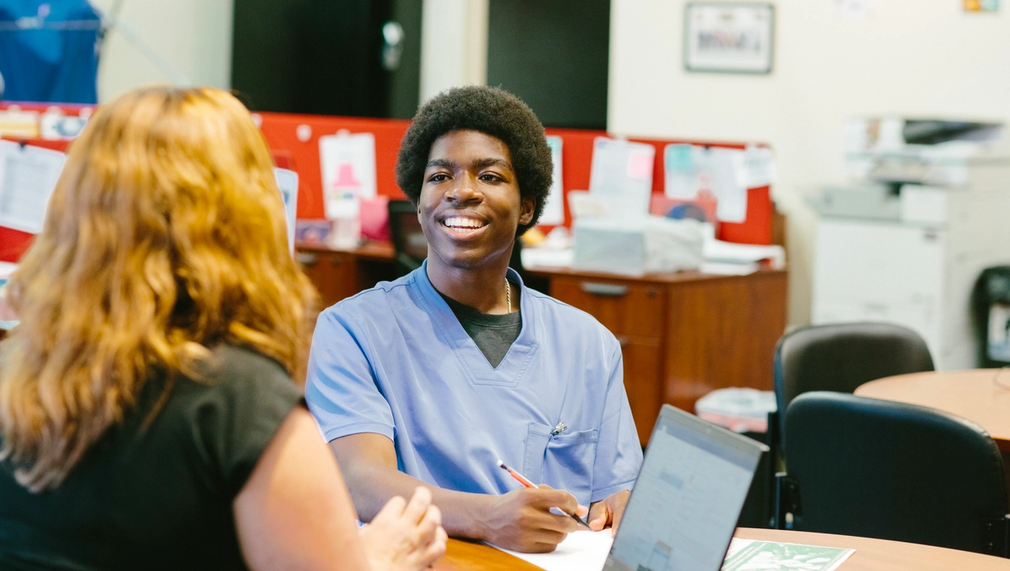Expanding Pathways to Living Wage for Foster Youth
First Place has launched an evidence-based Apprenticeship Model aimed at reducing the systemic barriers to living-wage employment for transition-age foster youth. Through strategic partnerships with industry leaders in high-growth sectors such as construction, healthcare, transportation and logistics, and information technology, First Place will assure foster youth enter the workforce with an increased competitive edge in the labor market, and the skillset needed to advance towards family-sustaining career pathways.

What is the primary issue area that your application will impact?
Support for Foster and Systems-Impacted Youth
In which areas of Los Angeles will you be directly working?
Central LA
East LA
San Gabriel Valley
South LA
West LA
South Bay
In what stage of innovation is this project, program, or initiative?
Pilot or new project, program, or initiative
What is your understanding of the issue that you are seeking to address?
The young people we serve have been deeply impacted by their experiences within the foster care and justice systems—systems that are still struggling to overcome their histories of entrenched racial inequity and discrimination that leave low-income, Black, Indigenous, People of Color overrepresented and under-supported. These broken systems continue to create overwhelming barriers for our young people that hinder their pathway to success. Furthermore, the COVID-19 pandemic has exacerbated the overwhelming barriers young people face when aging out of foster care. When youth enter our LA program, 57% are homeless or in unstable housing situations, 58% are unemployed, 36% are not in school, 32% are or have been involved with the juvenile justice system, and 100% are low-income. Compared to foster youth outside our programs, First Place youth are 4.5 times more likely to enroll in college, nearly 3 times more likely to be employed, and over 2 times more likely to live in stable housing.
Describe the project, program, or initiative this grant will support to address the issue.
Our Steps to Success Education and Employment Program is designed to ensure youth: 1) receive the necessary support to obtain their high school diploma or GED certificate; 2) are supported in enrolling and progressing in postsecondary education; and 3) gain skills around employment readiness, success in the workplace, job retention, and career advancement. After stabilizing every young person with safe housing, each youth is paired with a Youth Advocate (Masters-level social worker) and an Education & Employment Specialist. The team of three work together to develop a personalized action plan with short- and long-term goals to guide the young person throughout their time in program, ideally 12-18 months. To more equitably meet the unique needs of the diverse young people we serve, First Place has strategically enhanced our existing Steps to Success program to include an evidence-based Apprenticeship Model as an alternative to the traditional AA/BA college pathway. The model uniquely addresses the needs of transition-age foster youth, who must attain independence much more rapidly than youth who have family support. Youth “earn and learn” from day one, receiving hands-on training and career-focused education, while working toward industry-recognized credentials in high-growth industries. The model’s systematic approach to partnering with employers underscores employer needs, ensuring youth receive the necessary training to be competitive in the job market.
Describe how Los Angeles County will be different if your work is successful.
By the end of the one-year grant period, First Place will understand which employer and apprenticeship partners and/or types of apprenticeship programs are most effective in facilitating successful youth completion. We will also work to ensure youth are being connected to apprenticeships that align with their unique needs and skillsets, and further enhance tools for successful program completion. As the largest provider of housing and wraparound services in LA, First Place is uniquely positioned to expand the existing body of knowledge on the impacts of extended foster care and to support meaningful self-sufficiency outcomes among its young people. Our long-term goal is to demonstrate to other providers that evidence-based, individualized education, employment, and healthy living supports are critical for foster youth to beat the odds, and break the cycle of intergenerational foster care and chronic poverty.
What evidence do you have that this project, program, or initiative is or will be successful, and how will you define and measure success?
Managed by our Evaluation + Learning team of five full-time staff, our customized performance management database allows us to evaluate the efficacy of specific interventions, determine the best approach for each youth, and make real-time improvements to our programs. Our data-tracking system provides up-to-date information, including demographics, duplicated/unduplicated service counts, service outcomes, client feedback, and community impact. Program staff enter data on each young person weekly, and then we analyze this data monthly, quarterly, and annually. In addition, our recently implemented Youth Roadmap Tool identifies the most robust and effective interventions to support positive youth outcomes. Based on data from hundreds of My First Place program alumni, the system utilizes an equity lens to support program staff in developing highly individualized roadmaps of recommended services and milestones to help each young person achieve their goals.
Approximately how many people will be impacted by this project, program, or initiative?
Direct Impact: 200
Indirect Impact: 1,400